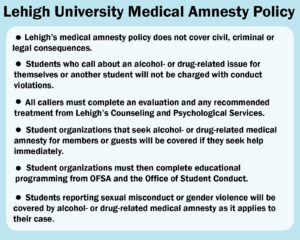
Designed by Anna Simoneau
A Penn State student was found unconscious in a fraternity house Feb. 4. After being moved, medical help wasn’t called until 12 hours later.
By the time medical assistance arrived, the student had slipped into a coma and was later declared dead.
Days earlier on Feb. 2, a Lehigh student was found unconscious in a fraternity house. Again, the call for medical assistance was prolonged. Although the incident at Lehigh did not result in a similar tragedy, the situation could have been alleviated had medical amnesty been contacted earlier.
Medical amnesty exists to ensure that situations like this are prevented. Chris Mulvihill, the interim associate dean of students, said students need to remember the Lehigh community cares about one another. He said it is important for students to seek immediate help and not worry about the consequences.
“What (students) need to understand is that they’re not going to get into trouble if they call for medical help,” Mulvihill said. “We’re not going to give people violations for doing the right thing. It’s not going to happen.”
Lehigh’s medical amnesty policy will stay the same since it was first implemented in 2006. Only minor language changes have been made over time to make statements clearer. Mulvihill said the reason students might not call for help is they think the policy is not real.
Students created the medical amnesty initiative after reading Cornell’s policy. Mulvihill said they thought it was important for Lehigh to have one too.
Under Lehigh’s policy, if a student calls it will still be recorded but will not be written on their disciplinary record. The student who makes the call will also have to talk to Mulvihill, write a reflection paper and go to the counseling center.
The policy states that a student who seeks medical help because of alcohol or drugs, whether for themselves or a peer, will not be charged with violations if they fill out an evaluation and other proper requirements. The full policy can be found on Lehigh’s website.
Patrick Ellison, ‘19, said he and his fraternity brothers were faced with a situation that was similar to the one at Penn State. He said his brothers are always willing to call if they see someone in a dangerous situation so they can keep everyone safe.
“It’s a student’s responsibility to get help if they see someone who needs it,” Ellison said. “We need to put people’s safety first. Students want to have fun, but we can’t do that if it is not safe.”
Ellison said the problem with the medical amnesty policy is students might forget exactly what it states, so they think they can still get in trouble by calling for someone. He said once students are in situations where someone needs help, people might be afraid to get involved.
“A big part of why someone doesn’t want to get involved is if it’s someone the person doesn’t directly know,” Ellison said. “It’s very hard to have the courage to do something. It’s a lot harder to make that call and make it confidently without legal or social repercussions.”
Gryphon Andrew Truman, ‘18, said he thinks the policy should be published in more places. He said that way more students can be aware of what it actually says and that it is real.
During Gryphon training, Truman said the policy is talked about extensively. He said the training also teaches them they should never assume things such as that the student was at a party. Instead, they need to understand how the student is feeling and if they need help.
Truman said it is good that students go to their Gryphons to get help for themselves or friends because Gryphons cannot see everything that happens and because medical amnesty applies when students ask their Gryphons for help.
“I think having the medical amnesty policy is really important,” Mulvihill said. “We try to publicize it as much as we can. . .There’s different places we have it to reach out to the most people.”
The policy is presented during first-year orientation, is posted in Greek houses and can be found on Lehigh’s website.
“You can advertise all you want and say, ‘Always go to party with a friend,’ but I think one of the biggest things is we need to empower students to help each other,” Truman said.
Truman said the policy is good to have. He said it allows transfers and first-years to know that the safety and health of students is a priority at Lehigh.
Mulvihill said timeliness is critical when students call for help. He gave the example of alcohol poisoning, which can affect someone quickly and sometimes without demonstrating any obvious sign. If someone notices the person is showing symptoms and immediately calls for help, the better off the person will be.
Ellison said it’s important to promote the medical amnesty policy so students are not only prepared to get the necessary help but also to receive more education on what to do and what to look for.





Comment policy
Comments posted to The Brown and White website are reviewed by a moderator before being approved. Incendiary speech or harassing language, including comments targeted at individuals, may be deemed unacceptable and not published. Spam and other soliciting will also be declined.
The Brown and White also reserves the right to not publish entirely anonymous comments.
2 Comments
“Mulvihill said the reason students might not call for help is they think the policy is not real.” Students do not call because they don’t want to get anyone ARRESTED or CITED for underage drinking, for which the consequences are far worse and much more costly than a student code violation, which is the ONLY thing that you are protected from with Medical Amnesty. Students know that anytime one notifies a Gryphon, or calls for an ambulance, the LU Police will also be notified and will respond. So if the problem is the result of underage drinking, students WILL be cited. Since LU Police are trained and certified by PA, they exercise full police powers. While this is great for investigating crimes and nabbing violent criminals on campus, they can’t “look the other way” when a law is broken, no matter how minor. Unsanctioned campus security forces at other colleges have much more leeway in this regard. Many first-time offenders merely need to talk to RA’s/counselors/deans, etc. at some other schools, and get a warning or other slap on the wrist. Not at Lehigh… you’re legally busted if you get caught – no ifs, ands, or buts. Most Lehigh students realize this hard truth after their very first weekend on campus, when many of them or their friends overdo it and wind up having to explain to their parents why they need to pay a huge fine and/or show up in court. Kind of sad that Lehigh actually goes out of its way to crack down on these kids their very first time away from home. After that, nobody reports anything to anybody for fear of getting themselves or their friends in trouble. Obviously this is incredibly dangerous, as there can be very real and serious consequences to the student(s) in trouble. But the reality is that 80% of college students drink (Greek or not), and 100% of them don’t want to get in trouble, legally or otherwise, for one night of stupidity. Therefore, most students at Lehigh and other campuses country-wide will opt to not get help and hope for the best. This will not change until the legal consequences change. Just think of all of the time, money and resources that could be saved if all colleges got together and lobbied to get the national drinking age reduced back to 18 (at least for beer and wine). 80% of college students will still drink – but legally – and won’t be hiding behind closed doors and in basements. Nor will they be nearly as afraid to summons help if it is needed! The other option, not likely to happen, is to have Lehigh’s police department unsanctioned by the state, so they have limited powers. Then they could perhaps use some discretion in who should be cited and who not. Sadly, not much will change if the status quo continues.
Yes, you are correct in your statements. While the student who the medical amnesty is called for is exempt from any University violations, the LU Police are first to respond and are very quick to cite the student for underage drinking regardless. They are faced with high fines, hours of counseling and a 6 month license suspension in the state of PA. The license suspension is the confusing part since the student isn’t behind the wheel of a car and wasn’t driving.